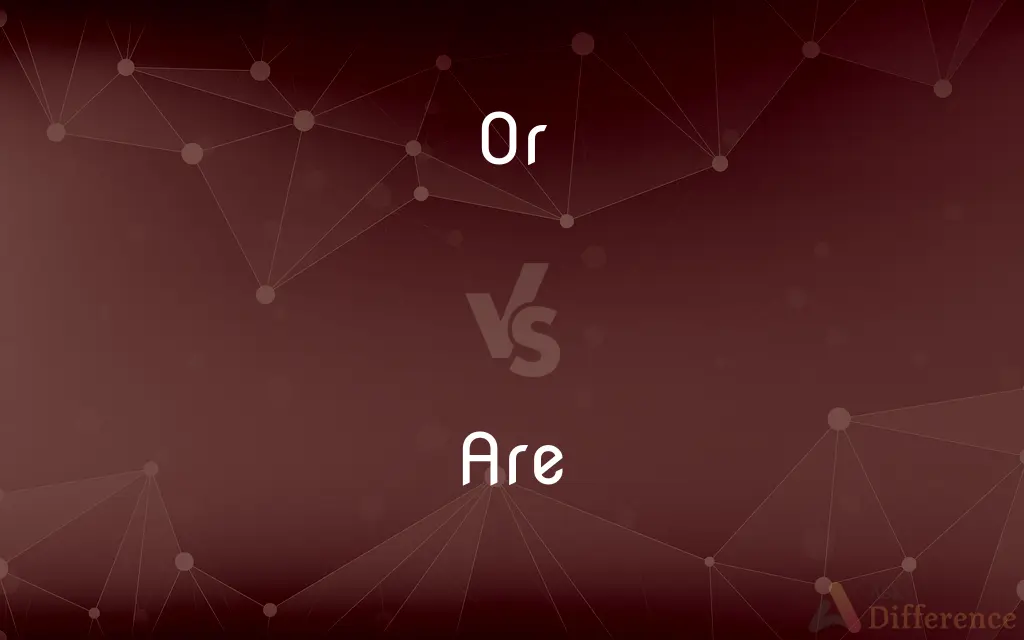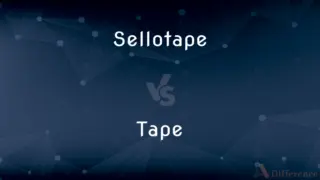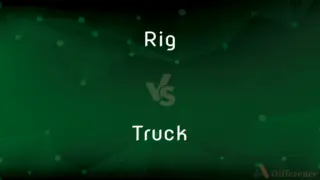Or vs. Are — What's the Difference?
By Urooj Arif & Fiza Rafique — Updated on March 9, 2024
Or is a conjunction used to offer choices or alternatives, while Are is the plural form of the verb "to be," indicating existence or state of being.

Difference Between Or and Are
Table of Contents
ADVERTISEMENT
Key Differences
Or is a conjunction connecting words, phrases, or clauses, presenting alternatives or choices. It's used in sentences where a decision or distinction is to be made, as in "Would you like tea or coffee?" Are, on the other hand, is the present tense plural form of the verb "to be." It relates to being, existence, or the state of things. For example, "The books are on the table."
Or indicates a selection between options and can also imply a mutual exclusivity where choosing one option negates the other. Are used to describe a condition or situation involving multiple subjects or entities, asserting facts, asking questions, or making statements.
Or functions to offer alternatives and choices within a sentence, emphasizing options. For instance, "You can take a bus or a train to get there." It sets up scenarios where a choice is required, highlighting the flexibility or variability in decisions. Whereas are is used to express the state, characteristics, or existence of subjects, denoting a state of being. "The dogs are friendly." It provides information about the subjects in relation to their conditions, attributes, or relationships.
Or can also introduce a synonym or explanation, serving to clarify or expand on a preceding term, such as "The felid, or cat, is a small, carnivorous mammal." This usage demonstrates its role in elaboration or clarification within discourse. Are, in contrast, helps in forming continuous tenses and passive voice, playing a crucial role in English syntax and grammar. "They are playing soccer." It illustrates its function in constructing sentences that depict ongoing actions or states, especially in plural contexts.
Comparison Chart
Part of Speech
Conjunction
Verb
ADVERTISEMENT
Function
Offers choices or alternatives
Indicates existence or state of being
Usage in Sentence
Connects alternatives
Describes state or action of plural subjects
Example Usage
"Soup or salad?"
"They are happy."
Role in Clarification
Can introduce synonyms or explanations
Helps form continuous tenses and passive voice
Compare with Definitions
Or
Indicates an alternative or equivalent.
An ophthalmologist, or eye doctor, can prescribe glasses.
Are
Utilized in continuous tenses.
They are running a marathon.
Or
Can imply a decision necessity.
You must study hard, or you will fail.
Are
Indicates existence in present tense.
There are many solutions.
Or
Used in either/or constructions.
Either go now or forever hold your peace.
Are
Forms questions about state or number.
How many are left?
Or
Presents a choice between words.
Do you want to leave now or later?
Are
Plural form of the verb "to be".
The cats are sleeping.
Or
A conjunction offering choices.
Would you prefer chocolate or vanilla?
Are
Used with plural subjects.
The players are ready.
Or
Used to indicate an alternative, usually only before the last term of a series
Hot or cold.
This, that, or the other.
Are
A metric unit of measurement, equal to 100 square metres.
Or
Used to indicate the second of two alternatives, the first being preceded by either or whether
Your answer is either ingenious or wrong. I didn't know whether to laugh or cry.
Are
Second person singular and plural and first and third person plural present indicative of be.
Or
(Archaic) Used to indicate the first of two alternatives, with the force of either or whether.
Are
A metric unit of area equal to 100 square meters (119.6 square yards).
Or
Used to indicate a synonymous or equivalent expression
Acrophobia, or fear of great heights.
Are
Inflection of be
Mary, where are you going?
Or
Used to indicate uncertainty or indefiniteness
Two or three.
Are
Inflection of be
We are not coming.
Or
Before. Followed by ever or ere
"I doubt he will be dead or ere I come" (Shakespeare).
Are
Inflection of be
Mary and John, are you listening?
Or
A logical operator that returns a true value if one or both operands are true.
Are
Inflection of be
They are here somewhere.
Or
Gold, represented in heraldic engraving by a white field sprinkled with small dots.
Are
Inflection of be
Or
Before.
Are
(rare) An accepted (but deprecated and rarely used) metric unit of area equal to 100 square metres, or a former unit of approximately the same extent.
Or
(logic) An operator denoting the disjunction of two propositions or truth values. There are two forms, the inclusive or and the exclusive or.
Are
The present indicative plural of the substantive verb to be; but etymologically a different word from be, or was. Am, art, are, and is, all come from the root as.
Or
Otherwise a consequence of the condition that the previous is false.
It's raining! Come inside or you'll catch a cold!
Are
The unit of superficial measure, being a square of which each side is ten meters in length; 100 square meters, or about 119.6 square yards.
Or
(tincture) The gold or yellow tincture on a coat of arms.
Are
A unit of surface area equal to 100 square meters
Or
(tincture) Of gold or yellow tincture on a coat of arms.
Or
(obsolete) Early (on).
Or
(obsolete) Earlier, previously.
Or
Before; ere. Followed by "ever" or "ere".
Or
A particle that marks an alternative; as, you may read or may write, - that is, you may do one of the things at your pleasure, but not both. It corresponds to either. You may ride either to London or to Windsor. It often connects a series of words or propositions, presenting a choice of either; as, he may study law, or medicine, or divinity, or he may enter into trade.
If man's convenience, health,Or safety interfere, his rights and claimsAre paramount.
Maugre thine heed, thou must for indigenceOr steal, or beg, or borrow thy dispence.
Or
Ere; before; sooner than.
But natheless, while I have time and space,Or that I forther in this tale pace.
Or
Yellow or gold color, - represented in drawing or engraving by small dots.
Or
A state in northwestern United States on the Pacific
Or
A room in a hospital equipped for the performance of surgical operations;
Great care is taken to keep the operating rooms aseptic
Common Curiosities
How does the usage of "or" affect sentence structure?
It connects alternatives, often necessitating a choice between them.
What is the primary function of "or" in a sentence?
To present alternatives or choices.
Can "or" be used to indicate a synonym?
Yes, it can introduce synonyms or explanations for clarification.
How does "are" differ from "is"?
"Are" is used with plural subjects, whereas "is" is used with singular subjects.
What verb form does "are" belong to?
The present tense plural form of the verb "to be."
Is "are" only used with human subjects?
No, it's used with any plural subjects, not just humans.
Can "or" indicate a mutual exclusivity between options?
Yes, choosing one option often negates the other.
In what tense is "are" typically used?
Present tense, for plural subjects.
Can "or" be used in questions?
Yes, often to offer choices in the form of a question.
Can "or" connect more than two items?
Yes, it can connect multiple alternatives.
How does "or" enhance the flexibility of language?
It provides the means to offer and consider multiple possibilities within discourse.
How does "or" contribute to decision-making in language?
By presenting options, it directly involves the speaker or listener in making a choice.
Does "are" have a singular counterpart?
Yes, the singular counterpart is "is."
How does context affect the use of "are"?
The context determines its use in describing states, actions, or existence.
In what situations is "are" indispensable in English grammar?
In expressing the state or action of plural subjects in the present tense.
Share Your Discovery

Previous Comparison
Sellotape vs. Tape
Next Comparison
Rig vs. TruckAuthor Spotlight
Written by
Urooj ArifUrooj is a skilled content writer at Ask Difference, known for her exceptional ability to simplify complex topics into engaging and informative content. With a passion for research and a flair for clear, concise writing, she consistently delivers articles that resonate with our diverse audience.
Co-written by
Fiza RafiqueFiza Rafique is a skilled content writer at AskDifference.com, where she meticulously refines and enhances written pieces. Drawing from her vast editorial expertise, Fiza ensures clarity, accuracy, and precision in every article. Passionate about language, she continually seeks to elevate the quality of content for readers worldwide.














































